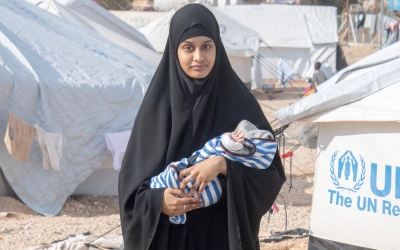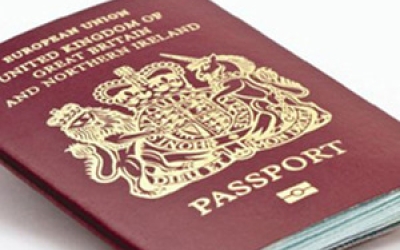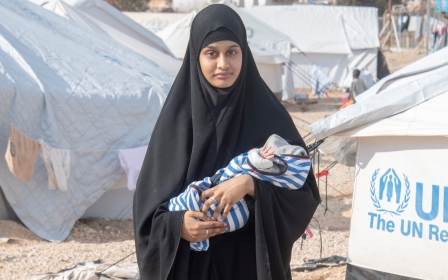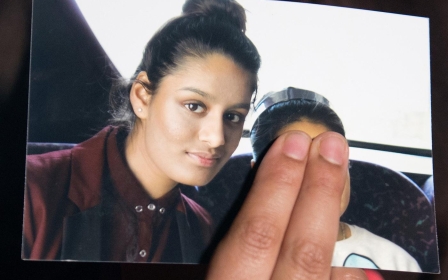UK considered bringing home Islamic State-linked nationals, court hears
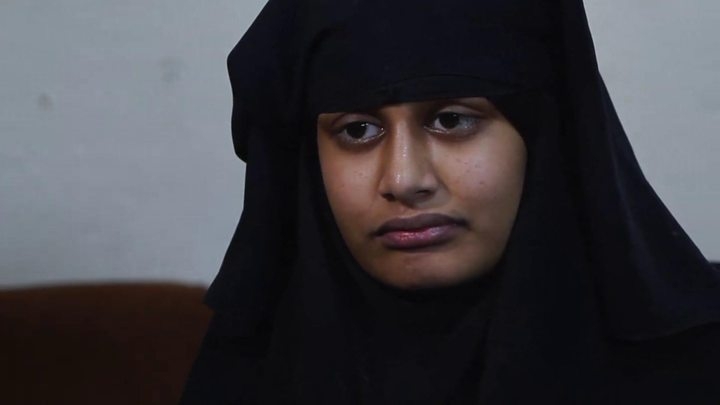
The British government considered the repatriation of nationals who travelled to Islamic State (IS) group-controlled territory and are now being held in camps by Kurdish forces in northern Syria, a court in London has heard.
The information emerged during an appeal being brought by Shamima Begum against the British government's decision to revoke her citizenship being heard at the Special Immigration Appeals Commission in London.
On Friday, Begum's lawyer, Tom Hickman, referred to a government document stating that it had explored options for the potential repatriation of British citizens suspected of aligning themselves with IS.
The document referred to at the tribunal by Hickman, was dated April 4, 2019, and titled "options for extracting British Nationals from Syrian IDP (internally displaced camps)."
"There was a foreseeable chance of her being repatriated to the UK because that’s stated in terms," Hickman said the government document noted on Friday.
He then went on to quote the government document which stated: “Although speculative, it is possible that at some point in the future British nationals will be treated differently.”
"We don't accept that it was merely speculation. It is possible she would have been taken back to the UK," said Hickman.
The court later moved into a closed session, meaning that journalists, members of the public and even Begum's legal team were excluded from proceedings.
The revelation departs from previous government statements on the repatriation of British nationals detained in Kurdish-run camps across northern Syria.
Speaking to the Times newspaper on Wednesday, Begum, who absconded to Syria from London aged 15 in 2016, said she feared being attacked by female IS militants inside the al-Roj refugee camp.
She raised concerns that a hearing against her citizenship revocation would have no impact on her current circumstances.
“My case is no different to that of the other British women here, many of whom have not had their citizenship removed,” she said.
“Their cases have not moved forward, though they still have British citizenship, so I can’t see mine changing quickly.”
'No way' of Begum returning
Last month, UK Home Secretary Priti Patel said that there was "no way" that Begum could return to the UK.
In previous statements, former ministers have shied away from committing to repatriating children or others on the grounds that it is considered too dangerous for officials to attempt a rescue.
Begum was stripped of her British citizenship by then-Home Secretary Sajid Javid in February 2019 shortly after giving an interview to the Times in the camp where she was being held.
The UK and citizenship-stripping powers
+ Show - HideThe UK has been described by researchers as a “global leader in using citizenship deprivation as a counterterrorism measure”.
Historic citizenship-stripping powers targeted at naturalised citizens on disloyalty grounds had largely fallen into disuse prior to 2002, when the government introduced new measures in an attempt to revoke the citizenship of Abu Hamza, an Egyptian-born cleric subsequently convicted of terrorism in the US.
The 2002 legislation allowed for British-born nationals as well as naturalised citizens to lose their nationality rights. Successive governments gradually broadened the scope of the powers so that home secretaries can now deprive anyone of citizenship if they are satisfied that doing so is “conducive to the public good” and would not leave an individual stateless.
No criminal conviction is required. Letters often state that individuals have been assessed as presenting “a risk to the national security of the United Kingdom”.
The government’s use of the powers surged to unprecedented levels in response to the perceived threat posed by British nationals returning from Syria.
Between 2010 and 2015, 33 people were stripped of their citizenship, according to Home Office figures. In 2016, 14 people were deprived, and in 2017 the number jumped to 104.
In 2018, the figure was 21, and in in 2019 - when Shamima Begum was among those targeted - it was 27. It then dropped to ten in 2020 and eight in 2021.
Some subjects of citizenship-stripping orders argue that they have been left effectively stateless, because the government bases its assessment that they are dual nationals on a right of citizenship to a parent’s country of birth, even if they have never taken up that citizenship or even visited the country.
In some cases the Special Immigration Appeals Commission, which rules on citizenship cases, has agreed: it has ruled in favour of British nationals of Bangladeshi descent on the grounds that Bangladesh does not consider them citizens if they have not claimed Bangladeshi nationality before the age of 21.
Human rights organisations and lawyers have compared the powers to “medieval exile and banishment”. Critics also point out that the powers create a two-tier system in which only those deemed to be dual nationals are at risk of losing their British citizenship; a measure that discriminates against naturalised citizens, immigrants and their children.
She is among dozens of British nationals who have travelled to Syria who have been stripped of citizenship by the government amid fears about the potential security threat posed by returnees to the UK.
It is understood that Javid made the decision on the advice that Begum could qualify for Bangladeshi citizenship due to the fact that her parents hold Bangladeshi citizenship.
Court papers noted that Patel supported her predecessor's decision to strip Begum of her citizenship on grounds that she was "aligned" to IS.
This new development also comes as the UK government faces mounting pressure to repatriate children of suspected IS members stranded in northern Syria who hold British citizenship or are entitled to it.
The government said it was exploring options to bring back orphans and unaccompanied children stranded in northern Syria, stating that it was working with "partners on the ground".
No indication, however, was given on the timeline for these repatriations or whether the government would consider taking in children whose carers are still with them in northern Syria.
Middle East Eye delivers independent and unrivalled coverage and analysis of the Middle East, North Africa and beyond. To learn more about republishing this content and the associated fees, please fill out this form. More about MEE can be found here.


